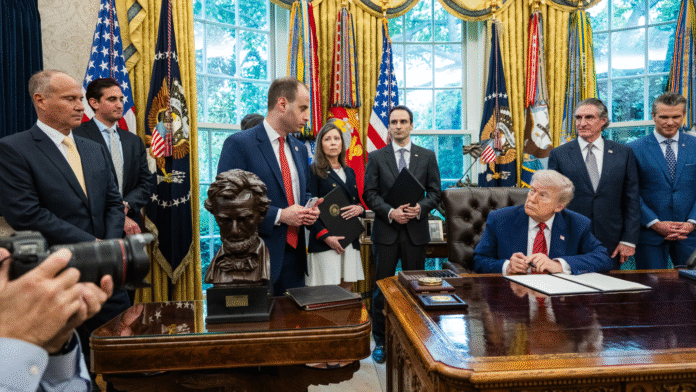Scientists are mulling whether the effort has merit or is simply an attempt to undermine independent science.
A trio of contrasting op-eds published recently in the journal Science illustrates the scientific community’s internal debate over the state of scientific integrity and whether to be receptive to the Trump administration’s research policy initiatives.
The White House claims the public has lost trust in science due to the previous administration misusing science to justify certain policies and the scientific community failing to address the “reproducibility crisis.” A centerpiece of the administration’s plan is the “Restoring Gold Standard Science” executive order issued in May, which requires agencies to revise their scientific integrity policies to align with certain principles, such as ensuring scientific studies are reproducible and protecting employees who offer “alternative scientific opinions.” It also establishes an enforcement process overseen by appointees designated by each agency head.
Various scientists have raised concerns about the enforcement mechanism, with professors David Michaels and Wendy Wagner writing in Science that the order “officially empowers political appointees to override conclusions and interpretations of government scientists, threaten their professional autonomy, and undermine the scientific capacity of research and regulatory agencies.”
In a dueling op-ed, White House Office of Science and Technology Policy Director Michael Kratsios defends the order as necessary to reinforce established principles of good conduct and accuses critics of being “more concerned with their preferred policy outcomes than with the procedures that reinforce scientific rigor and excellence.”
Kratsios does not directly respond to criticisms of the enforcement mechanism but states, “It is the responsibility of those appointed to represent the people to help direct and coordinate the taxpayer-supported research enterprise in the national interest.” He also states that while science ought to be kept free of “partisan politics,” there is also a need to preserve “democratic government from the excessive influence of the scientific establishment.”
Kratsios concludes by encouraging the scientific community to “take this government-led effort at self-reform and review how it too can support the highest standards of scientific integrity.”
The op-ed came one day after Kratsios sent instructions to agency heads detailing how they should incorporate the executive order’s principles into their research activities. The instructions do not prescribe specific actions but do provide more detailed explanations of the tenets originally described in the executive order. Agencies are to publish their implementation plans by Aug. 22.
Holden Thorp, editor-in-chief of Science, published his own op-ed the same day as Kratsios’ that sympathizes with critics of the order but encourages scientists “to support science and hold it accountable at the same time” and to reject the “false choice that only one or the other is possible.”
Thorp writes that, “It is logical to worry that the EO will be misused by the administration given the other disastrous decisions made about science so far, especially the cuts to funding and the barriers to recruiting international students.”
However, he also argues that the order and larger efforts by the Trump administration to weaken the scientific enterprise have been enabled by pervasive “sluggishness and defensiveness” in response to criticism.
Thorp suggests that the scientific community should “reaffirm its values” but do so on its own terms, “irrespective of actions from a government entity in the United States or elsewhere.”
Thorp’s op-ed details examples of journals being slow to retract papers, prominent scientists clumsily deflecting accusations of misconduct, and the closing of ranks within specific fields in response to credible criticisms of popular research.
He argues that these individual examples are not necessarily reflective of the larger scientific community, but that the distinction is moot if the public believes they are.
“Although science is driven by data, politics and public opinion are shaped by anecdotes and storytelling. Thus, pointing out that many of these incidents are the result of a small number of actors does nothing to change the political narrative,” Thorp writes.
“The defensiveness of investigators and institutions in responding to problems severely heightens the suspicion,” he adds. “Rather than filing lawsuits and hiding behind carefully crafted statements, the scientific community should be engaging in a conversation about problems and potential solutions.”
The White House highlighted that same passage in a press release as an example of “exactly why President Trump signed his Restoring Gold Standard Science executive order.”
Thorp criticized the administration just days later in a LinkedIn post for violating the very principles laid out in the executive order by citing fake studies in a CDC report on vaccines, which Thorp called “disgraceful” and “hypocritical.” He also acknowledged the challenges in holding the administration to account, writing that “calling it out is important for documenting all of this for posterity, but it’s not a political strategy that will stop this charade.”






